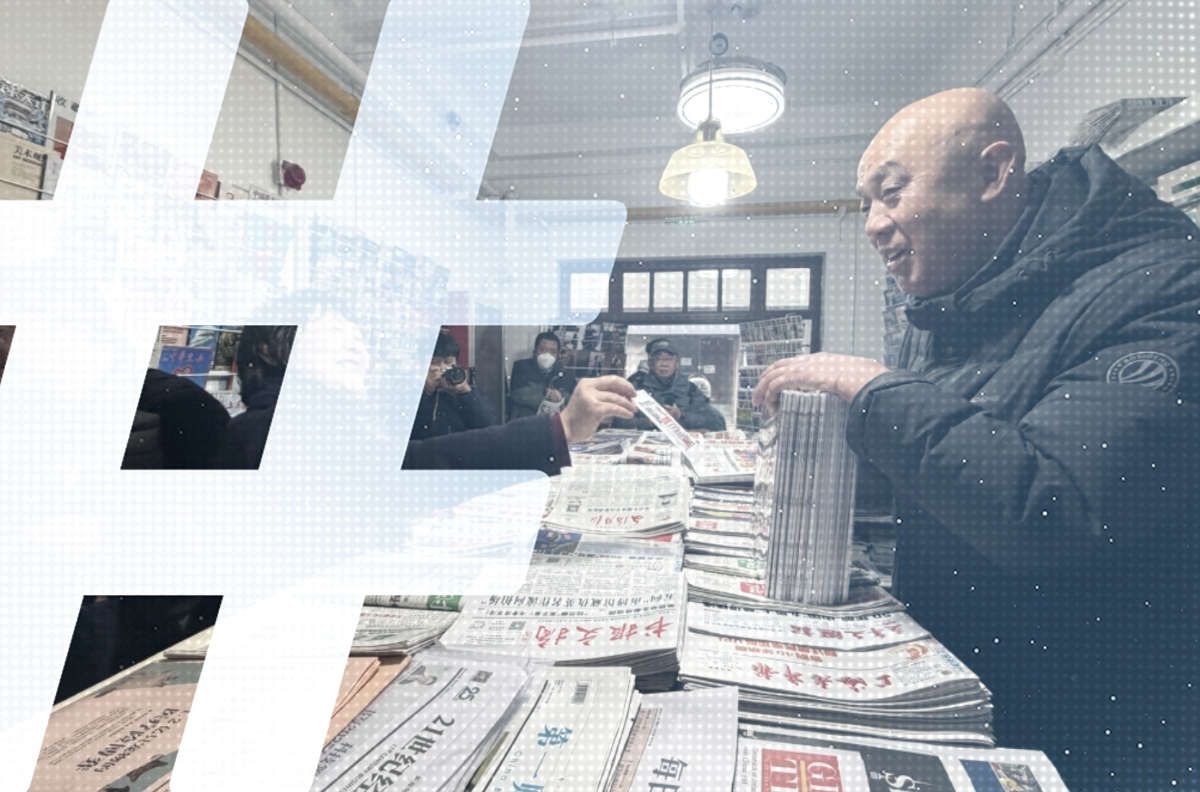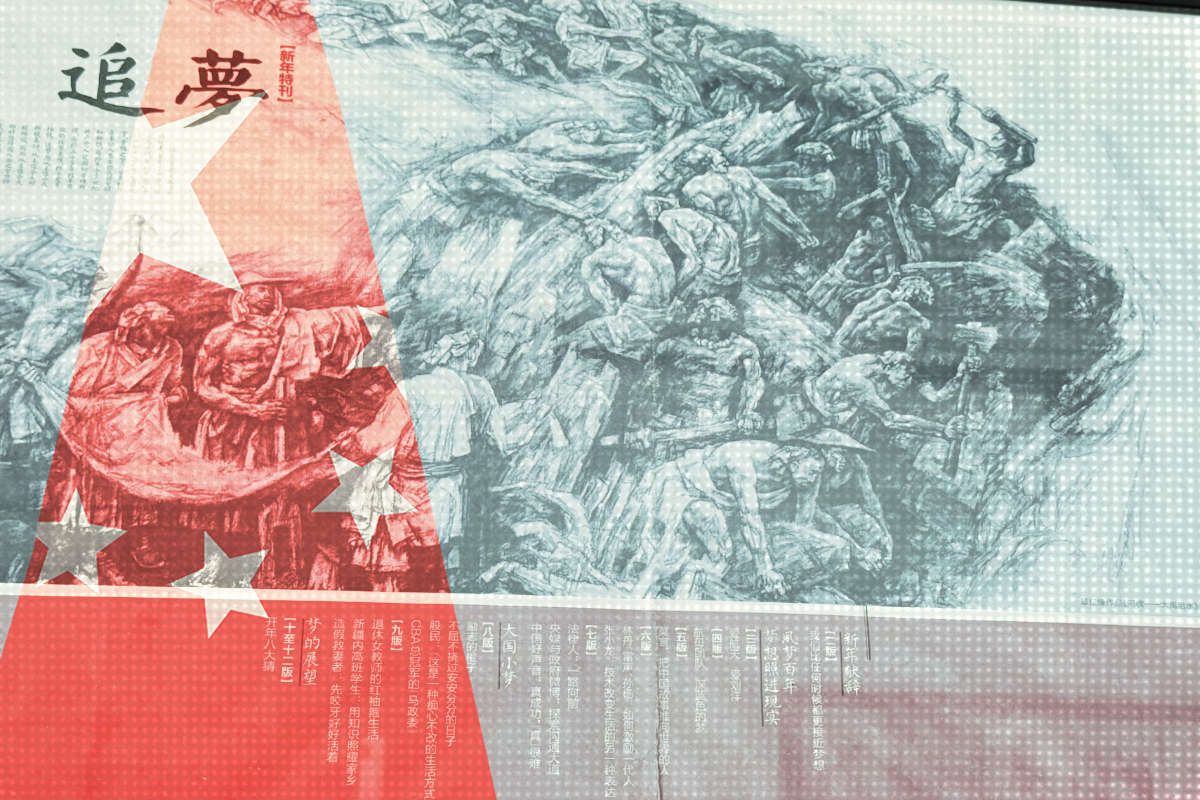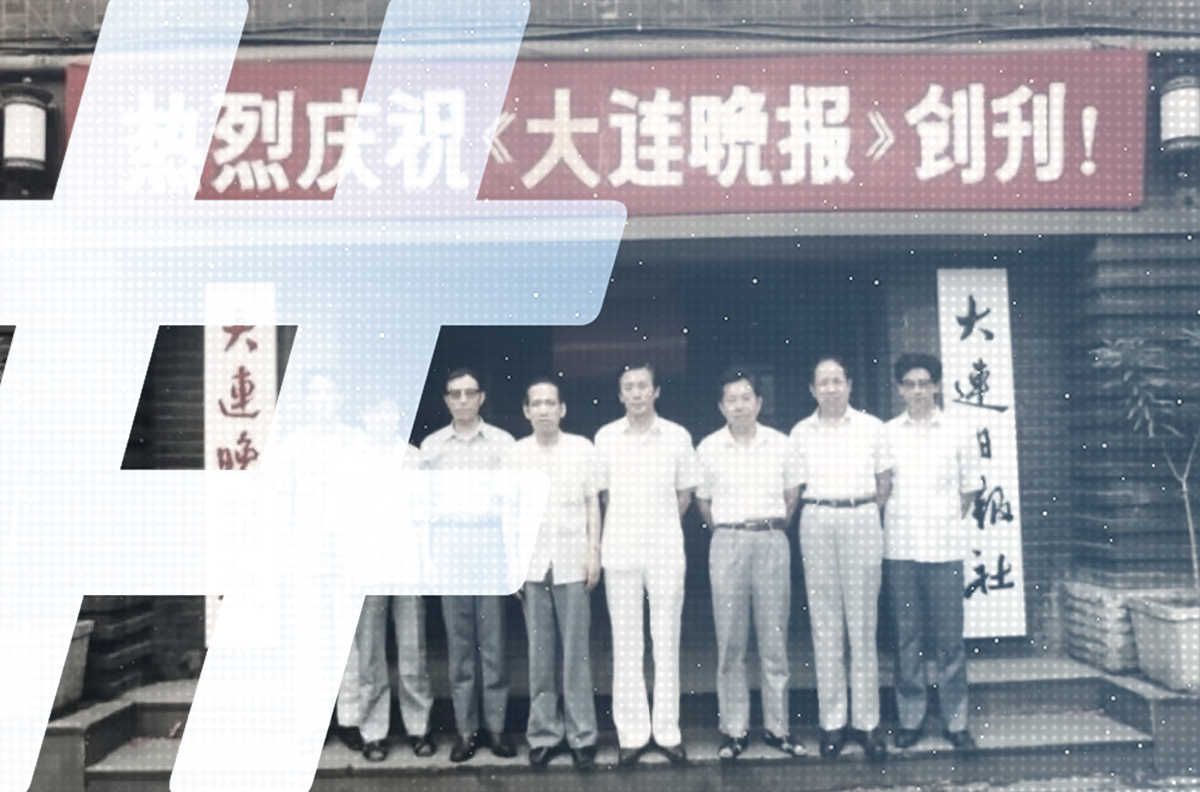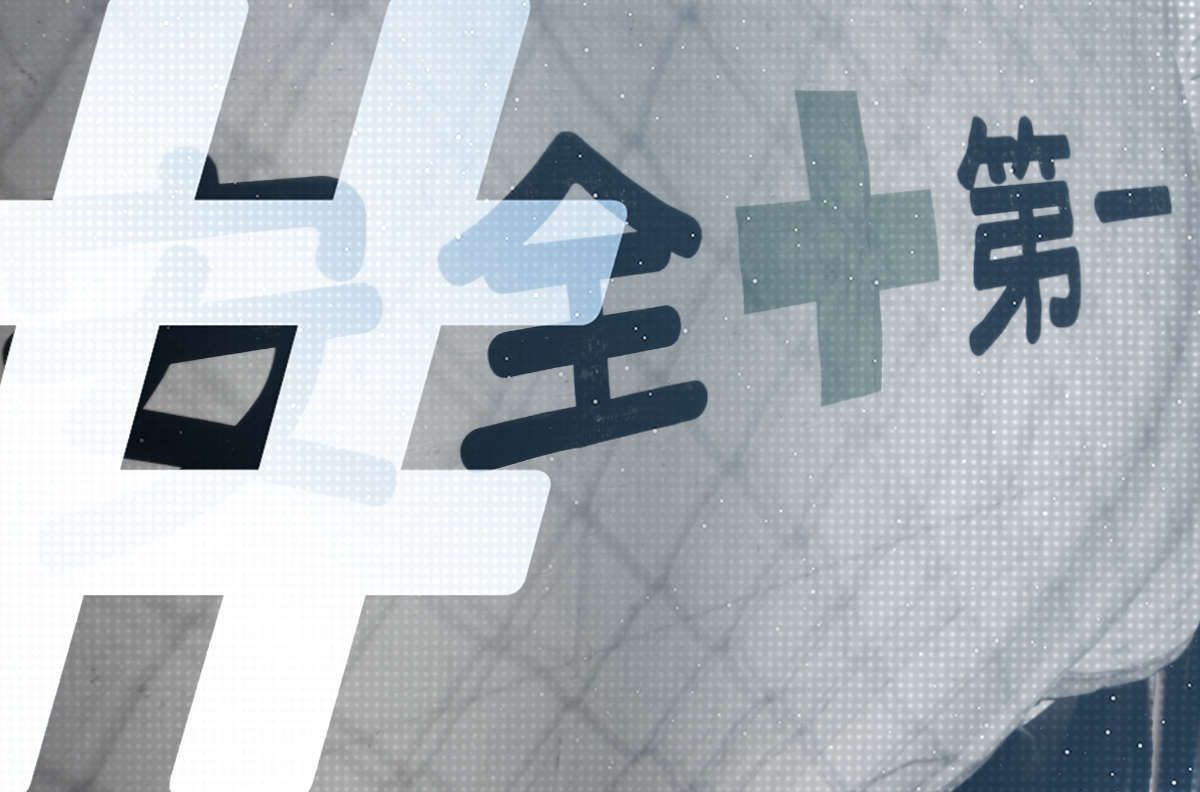In recent months, propaganda officials and communications pundits have spoken with a sense of newfound purpose about the need to revolutionize “news and propaganda” in order to achieve “the revival of the Party’s mass line.” Much of the dogmatizing is eerily redolent of China’s Maoist past, not a surprise considering that the idea of the “mass line,” or qunzhong luxian (群众路线), is closely associated with Mao Zedong. But there is a sense too that the most recent developments in communications technology, those “me-media” that promise to transform everyone’s future, have brought the Party back — at least potentially — to its roots.
The odd amalgam of romantic return and future promise is possibly best expressed in a piece recently published in People’s Forum magazine and re-run in the “Theory” section at People’s Daily Online. The piece is written by Li Xiguang (李希光), former executive dean of the School of Journalism and Communication at Tsinghua University and the current director of the university’s International Communications Center.
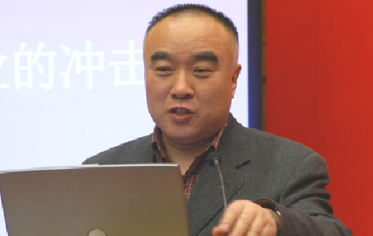
Professor Li, who presents himself to the outside world (what he calls the waibu/外部) as a champion of press reform in China with credentials in the West (he was a fellow at Harvard’s Shorenstein Center and was very briefly at the Washington Post as an Alfred Friendly Press Fellow in 1995), is also closely aligned with the CCP leadership. He often writes in confrontational terms about the need to counter “Western public opinion guidance” — public opinion guidance being the dominant term within the CCP since 1989 to refer legitimately to press controls, a strange confuting of vocabularies for an ostensible communications scholar — and about the challenges facing the Party’s “mainstream” ideology.
Here, for example, is Li Xiguang writing in the Party journal Seeking Truth in 2012, when Hu Jintao’s notion of the “socialist core value system” was all the rage:
Tested by a public opinion environment on the outside that is complex and severe, we must maintain clear minds, heightening our sense of readiness against hardship, and we must further strengthen our building of the socialist core value system, promoting the solid advancement of China’s international communication capacity, working hard to create an objective and favorable international public opinion environment beneficial to the project of socialism with Chinese characteristics.
In his most recent piece, Li writes a sort of re-cap of President Xi Jinping’s statements on propaganda and ideology over the past year and says Xi “points a clear reform direction in order to build the proper Party news and propaganda systems and mechanisms to enable the maintaining of correct guidance of public opinion.” For those who don’t recognize it, this last term is synonymous with the Party’s dominance of the agenda through news and information control.
The key to building the “proper Party news and propaganda systems and mechanisms,” says Li, is to re-envision the work of propaganda and “make the transition from a [vertical] bureaucratic system of administrative management (科层体系的行政主导) to a flat system of political management (扁平组织的政治主导). In other words, the whole Party propaganda culture must “flatten” in order to become more responsive and effective on all key battlegrounds in the war for public opinion dominance:
Only if we have our own voices in every field of public opinion can the Chinese Communist Party occupy the heights of public opinion, and grasp the power to channel public opinion.
The ultimate goal, says Li, is the “political mobilization [of the masses] in the internet era.” And he finds his corollary in the heady days of the revolution. “The organizational flattening (组织扁平化) of news and propaganda systems and mechanisms was in fact a fine tradition of our Party’s news and propaganda work during the revolutionary and reconstruction periods [of the CCP],” he writes. “For example, at important stages of the revolution, or important points in battle, Comrade Mao Zedong would personally write or edit the news articles of [the official] Xinhua News Agency. In the revolutionary period, the Chinese Communist Party was a flat structured organization, and so it was close to the people and could accomplish things especially for them.”
Introducing a new term for the loyal subjects who are to embody this new “flattened” structure, Professor Li says the Party must “actively find and foster propaganda activists (宣传积极分子) at the Party’s grass roots.”
In Li’s re-envisioned propaganda system, these “propaganda activists” will be working within the “mobile community of the me-media,” by which he means the new world of user-generated content.
Using the great ship of the new media to take to the seas, the propaganda workers of the Party can take their propaganda work among the masses to the mobile community of the me-media. Through the mass line, the Party’s policies and political line will be understood and accepted by the masses.
Only time will tell whether Li Xiguang’s vision of a new “flattened” news and propaganda system is visionary, or self-delusional — or actually policy.
Until then . . .
Our partial translation of Professor Li’s piece in in People’s Forum magazine follows:
“Clearly Ascertaining the Field and Position of Ideology“
August 22, 2014
People’s Forum
People’s Daily Online
“Only if we have our own voices in every field of public opinion can the Chinese Communist Party occupy the heights of public opinion, and grasp the power to channel public opinion.”
A whole series of remarks from Comrade Xi Jinping, including his “August 19” speech a year ago and his February 17 address to the Provincial and Ministerial Seminar at the Central Party School, provide a thorough analysis of the difficulties and problems facing guidance of public opinion in our country today. [In these remarks, Xi] touches on the crux of these issues in terms of systems and mechanisms, and he points out the inherent requirements for reforming and rebuilding the ideological foundations for our news and propaganda system.
The Importance and Urgency of Reforming and Innovating the Party’s Propaganda Work
Comrade Xi Jinping maintains a focus on matters of practice . . . and on the foundation of a sober awareness of the public opinion situation facing our country today, and taking the fundamental interests of the Party and the people as his jumping off point, he points a clear reform direction in order to build the proper Party news and propaganda systems and mechanisms to enable the maintaining of correct guidance of public opinion.
News and propaganda systems are not castles in the air. One of the objectives of reform to the news and propaganda system is the strengthening of the Party’s capacity to set political agendas, public agenda and news agendas, and in this way lead public opinion in society — so that the Party’s own direction for reform and development, and its own reform agenda, can take the lead in the development of public opinion in society. Reforming the mechanisms and systems of news and propaganda is also about ensuring that the Party’s future designs for reform are met with scientifically [i.e., that the proper preparations are made for their realization], that they follow the mass line, that they heed the voice of the masses, that they break through the black-box monopolization of reform questions by small numbers of elites and by capital interests.
Comrade Xi Jinping pointed our clearly in his “August 19” speech that ideological work concerns the fate of the Party and the long-term peace and stability of the country. It [also] concerns national cohesion and unity, and it is an absolutely critical task for the Party. In facing the false understandings in public opinion in our society today — for example, the disavowal of China’s development model and development path, the advocating of a capitalist China, the application of Western standards to China, the use of Western ideologies to counter Chinese ideology, the replacement of Chinese political systems by Western political systems, or the use of historical nihilism to deny the legitimate political power of the CCP or the validity of its revolutionary history — Xi Jinping has demanded that ideological departments must be ultimately and imperatively responsible for holding the ground.
As to the urgent work that the Party’s ideological departments must turn to now, the first matter is to ascertain clearly where their own thought and ideology territories are, where their battlefields are, where there main batteries are, where their main force lies, where the soldiers are who will defend the territory, and where their allies are. The propaganda departments of the CCP must make clear assessments of their advantages, disadvantages, opportunities and risks as they pertain to news and propaganda and to public opinion channeling.
Comrade Xi Jinping’s two important speeches on public opinion channeling help us make a clear diagnosis of our propaganda systems and mechanisms and focus on the crux of the issue. In the process of innovation of the systems and mechanisms of news and propaganda, we must emphasize “problem consciousness” (问题意识) and grasp the “principal contradictions” (主要矛盾).
The Objective of Reform and Innovation of the Party’s Propaganda Work
Through reform of the systems and mechanisms of news and propaganda, we can protect the masses’ feasible (切实的) rights to expression. The Party and the government should encourage rather than restrict the thoughts and opinions of the people on the future direction of the country, on political and economic reform and other major matters. Only if the calls of the masses are reflected proportionally in their free transmission can the elite levels of the Party accurately ascertain popular opinion, and have a correct grasp of the prevailing situations and trends in Chinese society. Party leaders must not live in dread of the voices of the people on the internet and social media. Where the views of the masses are concerned, they cannot simply be obstructed, and we cannot take the attitude of the ostrich who hides his head from reality.
According to the spirit of Comrade Xi Jinping’s speeches, the goal of the reform of propaganda work is: in ideology to uphold the leading position of Marxism; in action, to uphold the principle of serving the people (为人民服务) and serving socialism (为社会主义服务) as the guiding direction; in organization, to ensure that the leadership positions of various propaganda and culture organs at various levels are held by those who have respect for the Party and for the people, and who in action maintain a high level of uniformity with the Center; in terms of objectives, [the goal is] to build a news and propaganda system that is vested with Chinese characteristics, that is Chinese in style, that has substantial attractiveness, that has the power to convince and to create cohesion, to build new concepts, new categories and new formulations to connect China and the outside, in order to explain China’s basic national circumstances, its value concepts, its development path, its domestic and foreign policies, for a “news and propaganda discourse system” (新闻宣传话语体系) to emerge that can accurately, fluently and concisely transmit socialism with Chinese characteristics.
The propaganda organs of the Chinese Communist Party must carry out deep and thorough analysis of the domestic and international political situations and public opinion situations facing the Chinese Communist Party, researching the following urgent tasks: the correct public opinion channeling (正确舆论引导) of major current issues in thought and ideology; the correct public opinion channeling of major historical issues and the assessment of historical personalities; the public opinion channeling of sudden-breaking incidents and public incidents; public opinion channeling on social media and mobile media; public opinion channeling among the masses at the bottom [socio-economically]; public opinion channeling among the middle classes; public opinion channeling among intellectuals and social elites. And they must, on the foundation of the political consensus of the “Chinese dream” and through the process of public opinion channeling, establish a new united front of political conceptualization.
Strategies for Mass Work and Political Mobilization in the Internet Age
In terms of the management of news and propaganda, propaganda work must make the transition from a [vertical] bureaucratic system of administrative management (科层体系的行政主导) to a flat system of political management (扁平组织的政治主导). This is a basic preparation for doing a proper job of Party propaganda work. The flattening (扁平化) of the Party’s news and propaganda system also involves the organization, training and strengthening of propaganda teams and propaganda organs at the basic level.
The organizational flattening (组织扁平化) of news and propaganda systems and mechanisms was in fact a fine tradition of our Party’s news and propaganda work during the revolutionary and reconstruction periods [of the CCP]. For example, at important stages of the revolution, or important points in battle, Comrade Mao Zedong would personally write or edit the news articles of [the official] Xinhua News Agency. In the revolutionary period, the Chinese Communist Party was a flat structured organization, and so it was close to the people and could accomplish things especially for them. Cadres and soldiers had to ensure that they . . . “removed the concerns of each and every family” (为家家户户排忧解难). This was the root of the flesh-and-blood relationship between the people and the Party.
In an age where social media have brought the differentiation and fragmentation of society, it is all the more important that we actively find and foster propaganda activists (宣传积极分子) at the Party’s grass roots. These are the public opinion leaders of society’s grass roots, and they are the fertile soil on which the renewal of the Party’s propaganda work will emerge. Only the creation of a flat structured propaganda system can serve the revival of the Party’s mass line, once again mobilizing the masses together, organizing them, allowing the people to serve as the masters of the process of social and economic reform, and rebuilding the people’s trust and confidence in the Party.
Through flattened propaganda mechanisms, we can rebuild the offline connection and the online links between the Party and the people, [and we can] rebuild the mass propaganda methods of our grass-roots Party organizations. Party leaders and cadres must have the courage to walk the mass line offline, rapidly moving from “Weibo as a means of engaging in politics” (微博问政) to “directly listening to the people in politics” (问政于民) — for example, “engaging in politics in the fields” (田头问政), “engaging in politics in the villages” (村头问政), “engaging in politics at the worksite” (工地问政), “engaging in politics on transportation” (车间问政) and “engaging in politics on the street” (街头问政). Only by going and listening to the political and economic views of the people at different levels of society can we ensure that thoughts and viewpoints are pluralistic, and only then can we ensure that political struggle and mass line struggle in the public opinion sphere are realistic — and only then can the ruling Party innovate its work among the masses and arrive at a strategy for mass work (群众工作) and political mobilization (政治动员) in the internet era.
The propaganda work of the Party must directly serve the masses, and at the same time must serve various media from different social communities. The rapid development of new media has resulted in a great diversity of news and propaganda forms, news and propaganda products, news and propaganda production processes and news and propaganda channels. Using the great ship of the new media to take to the seas, the propaganda workers of the Party can take their propaganda work among the masses to the mobile community of the me-media. Through the mass line, the Party’s policies and political line will be understood and accepted by the masses. At the same time, the social reform voices of the broad masses of people will be transmitted to the upper levels [of the Party leadership], so that the voices of the masses take a prime place in reform discourse . . .

